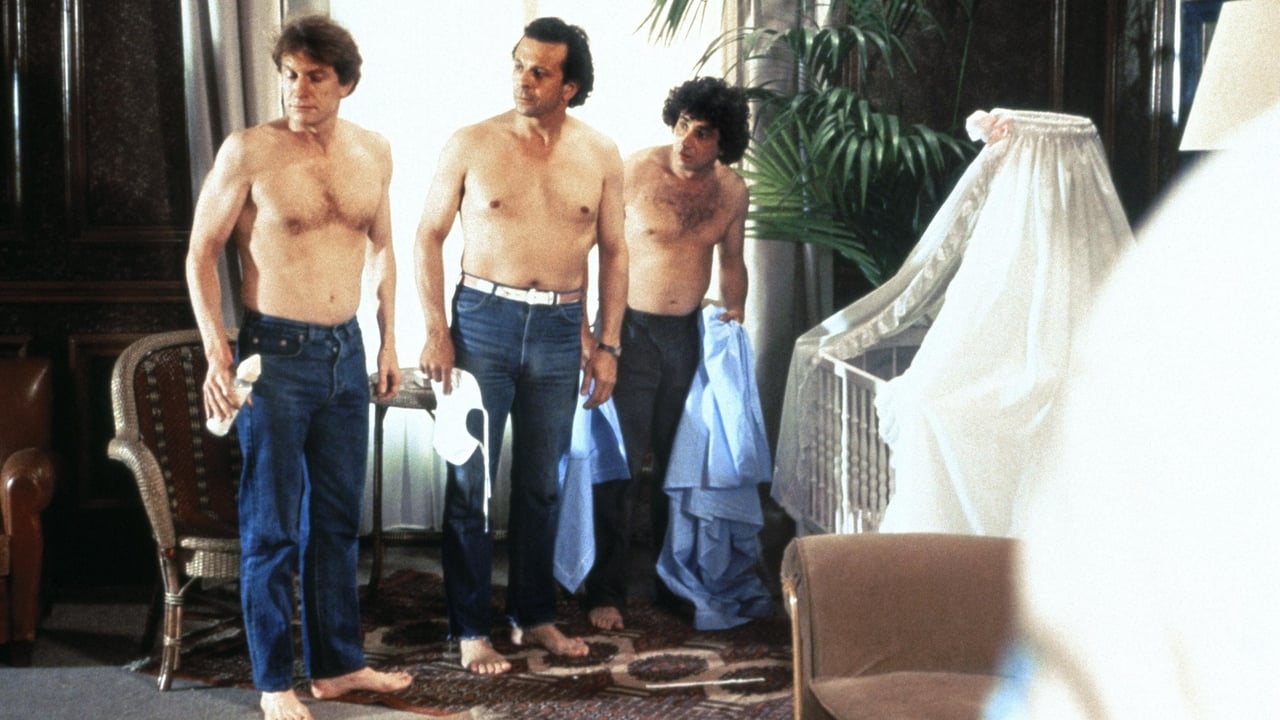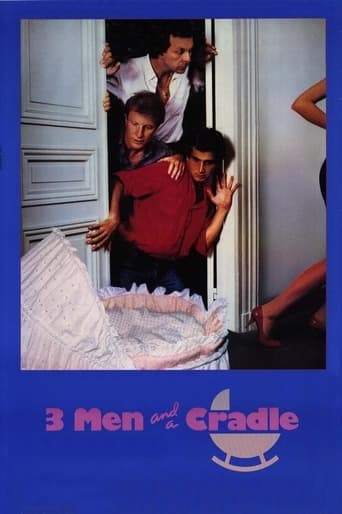

Very interesting film. Was caught on the premise when seeing the trailer but unsure as to what the outcome would be for the showing. As it turns out, it was a very good film.
... View MoreIt is so daring, it is so ambitious, it is so thrilling and weird and pointed and powerful. I never knew where it was going.
... View Moreif their story seems completely bonkers, almost like a feverish work of fiction, you ain't heard nothing yet.
... View More.Like the great film, it's made with a great deal of visible affection both in front of and behind the camera.
... View MoreIt's all in the title and it was enough to lure French views into the certitude of a heart-warming 'coming-to-realization' story and contribute to one of the hugest national box-office successes. Did the film stand the test of time for all that? In my opinion, Coline Serreau took a wonderful comedic premise for granted and indulged to some embarrassingly predictable situations.First, the men's so-called evolution that should be the reason-to-be of the story is non-existent, storytelling-wise. The film is a series of situations happening less because it's real, but because it's required by Serreau's script. I know "3 Men and a Cradle" belongs to the "Classics of French Comedy" category and features a great ensemble cast, even the little girl steals the show, but overall, the film has the appeal of a charming sitcom episode with the same level of superficiality.First, the film insists so much about our three men being hardcore bachelors and successful womanizers that we already expect the baby to change their attitudes toward women for the better. Although little Marie doesn't speak quite exactly in favor of the mother who abandoned, no matter how 'struggling' she was. Anyway, as soon as she makes her entrance, it's a revolution in diapers knocking on the doors, and we expect an avalanche of laughs never deprived from a tender side.We get them, but how heavily caricatured they are! The look on Pierre's face (Roland Giraud) when the pharmacist educates him about milk and diapers is naturally supposed to highlight the fact that he's in a totally unfamiliar territory. Michel (Boujenah) getting hysterical because the baby cries is supposed to create the 'HA HA' effect. Then they naturally vent their anger on each other "don't talk to me with that tone" etc. etc. It's noisy, whiny, hence funny.Before Jacques' come-back, (he's the steward played by André Dussolier) the film digs into heroin subplot, I guess heroin was more 'relevant' than 'hashish' for the story. And we're supposed to accept that the reasonable Pierre, and the sensitive Michel, would give the cradle to two punks, believed that was the pack Jacques told them about. "Yeah, men can be stupid." believes Coline Serreau. Then, the Narcs come, Michel hides the heroin, knowing the cops would be stupid enough not to checks in the diapers.Then Jacques comes back, and instead of speaking, Pierre and Michel remain mysteriously silent, and it's only after three desperately long minutes that they finally tell him. I hated that scene because it was too staged, too 'marketed' at the expenses of believability. That was the kind of gag a sitcom could have afforded, not that kind of realistic comedy. When Jacques was getting hysterical, the only thing that was missing to complete the picture was a laugh track.Then, they organize themselves and the film works reasonably before getting back to hackneyed situations. When one of Jacques' one-night hits realizes there's a baby in the house, she didn't get her fun then she leaves. Since Serreau believes that men don't care for babies, it's only fair that she'd believe not every woman would look at one, or at least, ask how come there's one in three bachelor's house. After all, even the mother left the baby without the decency to ring the bell, or wait for the door to be opened.Naturally, all the bachelors invited to a party don't care for Marie, not even one of the female guests, and someone says exactly the things that will trigger a defensive reaction from Pierre (who, in fact, thought like him). Unsurprisingly, Pierre shouts, the guest leave, we get it, Marie conquered the three guy's hearts. But then again, the mother comes back, they're happy to give Marie's back, all is forgotten; they all party and make up in the bedroom for the lost time (even Michel).And guess what happens next, they miss the girl, and don't care anymore for the rest. Everything in this film can be seen coming from a mile. Take the moment where Pierre finds out that Jacques left with Marie, he's obviously upset, but keeps in denial. We know he misses the girl, so why such a poor comical device by making him pretend that he doesn't care? When it can go for truly heart-warming moments, the screenplay opts for cheap laughs.I still liked the ending, having Marie coming back, and the three men genuinely happy like little children, what a cute sight!. But that cuteness hides a more 'paternalistic' attitude toward men, from the perspective of Coline Serrau, who exploit the same one-dimensionality following the plot's requirements. either, they're the bachelor-who-don't-care or the three-little-daddies, but the evolution process is never clear.It's all in situations, when they don't shout at each other because of the baby, they shot at other people (friends, the nurse ...) because of the baby. "3 Men and a Craddle" is probably one of the noisiest comedies ever, and not because of the cries. And in the middle of this cacophony, the film provides some tender and poignant scenes, but it's precisely because they're good that we hardly believe the rest.How could Michel who loved little Marie even more than her father, be so jovial immediately after she left? Why should they go through the same stages in the same time? Michel could have been sad from the beginning. The three actors do a fine job showing that every man can finds a good spot in his heart to fill it with love. That's the film's premise, it is good, the ending is predictable but good too, yet in-between, some situations don't seem to think much of our intelligence.There were so many great French comedies in the 80's, but, I wonder why this one should receive the 'masterpiece' badge. I can believe the American remake is not as good, but I'm looking forward to watch John Ford's "3 Godfathers".
... View MoreWow...this is the first time I ever used the words schmaltz and ennui in a film, but it does fit this familiar movie. I say familiar because it's one of the most universally recognized films--being a huge hit in France as well as the US when Hollywood remade it as "Three Men and a Baby". And, if you've never seen either, they're worth seeing but far from essential viewing. Pleasant fluff is how I'd categorize them."3 Hommes et un Couffin" is a decent story that has a few rough spots. It begins with three swinging guys sharing an apartment. When Jacques is out of the country (he works for the airline), a baby is left on their doorstep with a note saying the baby is Jacques' and the mother is going to America for six months to do a modeling assignment. Obviously this woman is NOT up for the Mother of the Year award! In the interim, his two roommates run themselves ragged caring for the baby and resent Jacques. There are two serious problems, however. First, it may not be Jacques' kid. Second, there is a really dumb and unnecessary subplot involving drug dealers--and it seriously distracts from the film.Eventually, the irresponsible mother returns and by now, the three men have become attached to the baby. She takes it and the men go through a profound sense of loss and depression (hence, the ennui). And, in the end, there is a schmaltzy 'everything will work out fine' ending. Enjoyable? Yes. But the film would have benefited from several changes--dropping the drug subplot, making the mother somewhat likable or at least understandable and getting rid of all the depression near the end. However, who am I to say--the movies made a bazillion bucks!!! Just don't expect magic--just some pleasant viewing.
... View MoreFirst, this movie is a beautiful example why there's am more European kind of humour and a more American kind of it. I once read an American critic who honestly complained that all the funny things happening in this movie were so previsible. Wow, he even must have thought that was smart to realize. In fact, that's what this movie is all about: You know what's going to happen and you enjoy to see HOW it will happen. That's why this movie was remade in the US with Tom Selleck and stripped of all it's original charme, only to be found "better" by some people. Second, this movie is kind of a test whether you should become a dad/mum in your life - or better leave that to others. It worked with me ..two kids... If you vote this movie "9" or above, you should get kids. Below "5" ? Think again! ;-)
... View MoreShortly after its initial release this became - in terms of viewing figures - the most popular French film after Le Grande Vadrouille and it's not too difficult to see why. There's something for everyone to write his or her 2,500 words about in this story of three male chauvinists getting in touch with not so much their feminist side as their maternal instincts and, for good measure, a sub-plot involving drugs which disappears without trace halfway through. Serreau is clearly interested in exploring role reversal and turning the traditional role-playing tables so that by the end of the film the three male chauvinists have learned not only to care about and/or love baby Marie but are light years ahead of the natural mother in terms of how to care for her in a literal sense. The three principals, Roland Giraud (Pierre), Michel Boujenah (Michel) and Andre Dussollier (Jacques, the natural father of Marie) were all relatively unknown at the time - Dussollier was almost unrecognizable to boot - and though all three have worked steadily since only Dussollier has achieved recognition outside France, and this probably worked in the film's favour just as conversely the higher profile of the Hollywood actors in the inevitable remake worked against what was a lousy film anyway. As usual the best of the dialogue loses in translation but sufficient original flavour survives to make this a highly enjoyable romp.
... View More